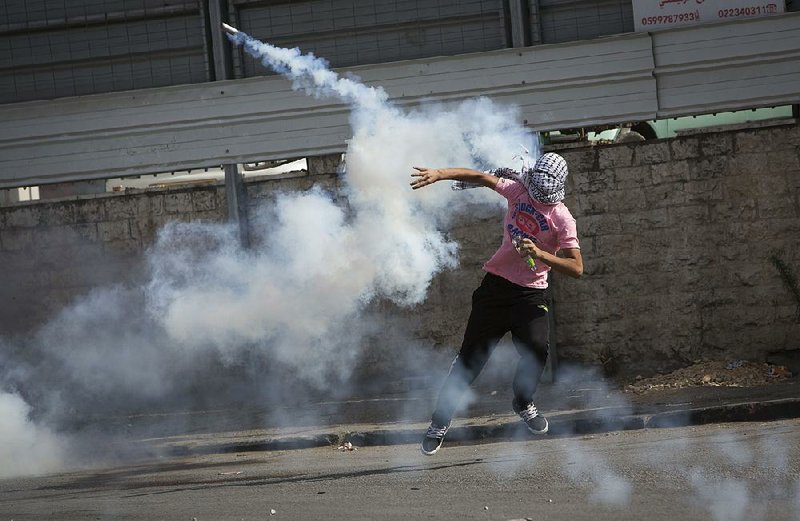JERUSALEM -- Israeli police clashed with Palestinian protesters Tuesday in a third straight day of unrest at a Jerusalem holy site.
Police entered the Al-Aqsa Mosque compound early in the morning to disperse a group of protesters who had holed up inside the mosque overnight, said police spokesman Luba Samri. The protesters threw rocks, fireworks, concrete blocks and a firebomb at the officers, she said, adding that two Palestinians were arrested and five police officers were slightly injured in the violence.
A firebomb thrown at police from within the mosque ignited a rug and wooden planks piled up by the protesters, Samri said. Mosque officials later extinguished the fire, and the police managed to restore calm and open the site for visitors.
Azzam Khatib, the director of the Waqf, the Islamic religious authority that oversees the compound, said Israeli police entered deep inside the mosque in what he called "a very dangerous development." Police denied the allegation and said officers only removed the barricade that protesters had set up at the entrance.
The director of Al-Aqsa Mosque, Omar Kiswani, blamed Israeli police for the tensions and said the gate used for visitors to access the site should be shut. He did not comment on the protesters' purported use of firebombs from within the sacred place, the third-holiest site in Islam. Police have said firecrackers and firebombs thrown from within the mosque have caused fires.
Nearby, more Palestinian protesters gathered, and police used tear gas and stun grenades to disperse them. Later, police said a Palestinian attacked two young Jews in Jerusalem's Old City, then ran away. He was later arrested, police said.
Late Tuesday, three Palestinians were wounded in clashes between militants from the Islamic Jihad group and Palestinian security forces in the Jenin refugee camp in the West Bank, doctors and security officials said, speaking on condition of anonymity under regulations.
Palestinian police raided the camp after militants from Islamic Jihad opened fire during their own news conference, in anger over the clashes at the Al-Aqsa Mosque in Jerusalem. Palestinian police exchanged fire with the militants. One police officer and two bystanders were wounded in the shooting, according to witnesses, who spoke on condition of anonymity for fear of reprisals.
The compound in Jerusalem's Old City is a frequent flash point, and its fate is a core issue at the heart of the Israeli-Palestinian conflict. It is known to Jews as the Temple Mount, site of the two biblical Jewish temples. Muslims revere it as the Noble Sanctuary, where they believe the Prophet Muhammad ascended to heaven.
Non-Muslim visitors are allowed to enter the site only at specific hours and are banned by police from praying there.
Muslims view these visits as a provocation and accuse Jewish extremists of plotting to take over the site. The compound often becomes the center of tensions on major Jewish holidays such as Rosh Hashana, the Jewish new year, which ended Tuesday night.
The site is so holy for Jews that they traditionally have refrained from praying on the hilltop, congregating instead at the adjacent Western Wall.
Israel's chief rabbis, as well as the rabbi of the Western Wall, have issued directives urging people not to ascend the Temple Mount, arguing that Jews could inadvertently enter the holiest area of the once-standing temple, where it was forbidden to tread.
But there is a movement advocating the rights of Jews to pray at the hilltop. Some try to get around the ban on prayers by secretly mumbling the words.
Israeli Prime Minister Benjamin Netanyahu vowed tougher measures to curb Palestinian violence at an emergency meeting Tuesday night.
Netanyahu said Israel "will use all necessary measures to fight against those who throw stones, firebombs, pipe bombs and fireworks in order to attack civilians and police."
He said he will take steps so attackers will face tougher punishment.
Netanyahu said Israel is committed to ensuring the status quo at the holy site but that "rioters won't be allowed to stop Jewish visitors" on their way to the hilltop.
Palestinians also clashed with police in the West Bank on Tuesday.
Saeb Erekat, a senior Palestinian official, blamed Israel for the unrest, saying Netanyahu "is trying to push us to the cycle of violence, extremism, bloodshed and chaos."
Israeli Foreign Ministry spokesman Emmanuel Nahshon rejected the allegations, adding that the recent skirmishes are "an attempt by Palestinians to change the status quo in a violent way."
Information for this article was contributed by Nancy Benac and Mohammed Daraghmeh of The Associated Press.
A Section on 09/16/2015

